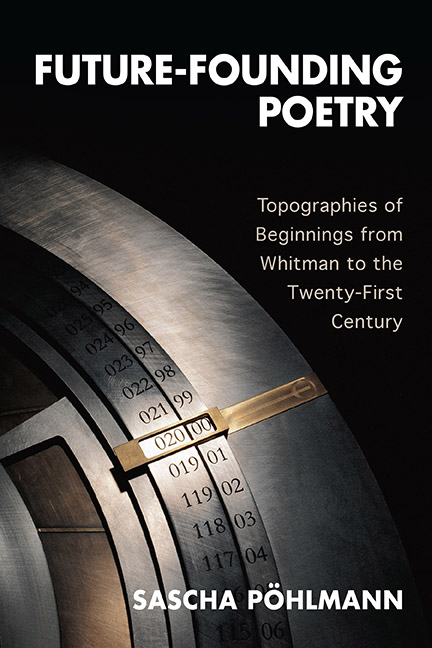Book contents
- Frontmatter
- Contents
- Acknowledgments
- Introduction: On How to Begin, and Where
- 1 Whitman: Beginning American Poetry
- 2 Williams: Beginning Again
- 3 Hughes: Urgent Beginnings
- 4 Rukeyser: Communal Beginnings
- 5 Ginsberg: Defiant Beginnings
- 6 Future-Founding Poetry after 9/11
- Conclusion: On Where to End
- Notes
- Works Cited
- Index
5 - Ginsberg: Defiant Beginnings
Published online by Cambridge University Press: 25 May 2021
- Frontmatter
- Contents
- Acknowledgments
- Introduction: On How to Begin, and Where
- 1 Whitman: Beginning American Poetry
- 2 Williams: Beginning Again
- 3 Hughes: Urgent Beginnings
- 4 Rukeyser: Communal Beginnings
- 5 Ginsberg: Defiant Beginnings
- 6 Future-Founding Poetry after 9/11
- Conclusion: On Where to End
- Notes
- Works Cited
- Index
Summary
It can can't go on forever.
—Allen Ginsberg, “Angkor Wat”RUKEYSER'S LATER WORKS can be understood as indications of a qualitative change regarding the sense of finality that future-founding poets oppose in their aesthetic and political struggle, which is a consequence of living in what is increasingly perceived to be “the first century of world wars” (MR 430). Even though the varieties of finality that Hughes addresses are certainly of crucial importance to the oppressed he speaks of and speaks for in his poetry, they do not quite match up to the magnitude of the finality that would present itself to all of humankind as the twentieth century entered its second half. Hughes and Whitman (and to a lesser extent Williams) certainly considered their social struggles to be far-reaching, if not all-encompassing, and none of them would be as modest as to claim anything but global relevance of the beginnings they made against the respective threats of their respective endings. However, without diminishing the relevance of their poetic and political projects, one may argue that the discourse of finality, of antifuturity, truly only reached a global scale after August 1945, when the first atomic bombs in human history were dropped on Hiroshima and Nagasaki, beginning the nuclear age and the Cold War, and along with it the very real possibility that the world might actually end in a man-made firestorm of global proportions, destroying life itself on planet Earth. As if one narrative of mutually assured destruction was not enough, a second entered the picture a little later, but ultimately no less forcefully: the discourse of ecological catastrophe and its own threat of global destruction, a different way the world could end, and indeed will end unless humans find a way to address the issues at hand.
Both nuclear war and environmental destruction present imaginations of apocalypse that previously had been confined to the sphere of religion, only now with no promise of redemption, and they pose the most brutally direct challenge to a future-founding imagination. Simply speaking, if there is not going to be a future, then why found anything? Or, alternatively, what if the future cannot be founded anymore, try as we might?
- Type
- Chapter
- Information
- Future-Founding PoetryTopographies of Beginnings from Whitman to the Twenty-First Century, pp. 256 - 303Publisher: Boydell & BrewerPrint publication year: 2015

